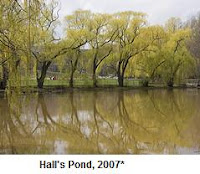It's a famous scene, of course, from Robert McCloskey's classic children's book Make Way for Ducklings. But it also describes an actual event that took place on Beacon Street in Brookline in 1919 -- more than two decades before McCloskey's award-winning book appeared in print.
The tale was told in the August 16, 1919 edition of the Brookline Chronicle. ("Mallard Moves Large Family: Shows Rare Intelligence in Crossing Thoroughfare.")
A pair of mallards, reported the Chronicle, had been observed each summer for four years flying from the Muddy River to Hall's Pond to make their nest. When the ducklings had hatched and were ready to fly, the whole clan would make its way back to the Muddy River to live.
 This particular year the ducklings -- ten of them -- hatched later than usual, on June 24th. Something happened to one of them during the night of the 26th, however, and the next morning the mother duck -- "evidently realizing that the place was unsafe, and doubtless with the happy memory of the Fenway and of the river with its sheltered islands" -- set out on foot with her not-yet-flying family.
This particular year the ducklings -- ten of them -- hatched later than usual, on June 24th. Something happened to one of them during the night of the 26th, however, and the next morning the mother duck -- "evidently realizing that the place was unsafe, and doubtless with the happy memory of the Fenway and of the river with its sheltered islands" -- set out on foot with her not-yet-flying family.At eight o'clock that morning [reported the Chronicle] she set out on the long journey, followed by the nine little ones, then only three days old and so tiny as to be hardly distinguishable in the long grass. Up the bank they went, and down the nearby alley, and a few moments later the astonished gaze of the traffic officer stationed at the corner of Beacon and Carlton Streets beheld them preparing to cross the wide main thoroughfare. Much amused and greatly interested, he stopped all traffic on the busy street until the duck, quacking continuously, had conducted her brood safely to the other side.A second policeman on the scene escorted the mallards up Carlton Street and down Colchester Street to the Fenway.
But here the greatest difficulty of the journey was encountered, for the railroad tracks had to be crossed in order to reach the river. To go over the bridge [the Carlton Street Footbridge] was impossible for such little creatures, nor could they step over the high rails of the double track. Mother Duck became anxious. She led the little ones down to the bank; she urged them vociferously; she (so the eye-witness describes it) went close to the rail and 'rolled' herself over it, calling the ducklings to follow. And at last they did. Imitating her maneuver with all their tiny strength, they 'rolled' or pushed themselves over the same way.Could this story have been the inspiration for Robert McCloskey's classic tale? It seems unlikely. McCloskey was five years old in 1919, and didn't come to Boston (to study at the Vesper George Art School) until 1935. But he did have this to say about the origins of the story:
Joyfully they scrambled up the opposite bank, across the path and the strip of grass, and in another moment they were splashing in the river, where they swam and paddled about, seeming entirely at home and nothing daunted by their extraordinary adventure.
We are inclined to think of a duck as one of our most stupid creatures [continued the story], but can a bird be thought dull who could plan and execute such a move as this? People may say it was merely the instinct of preservation. But still one wonders how that mother duck, who had always until now flown the distance between pond and park, high above the housetops, knew so surely what streets would take her there and make the shortest possible journey for those tiny ducklings. And besides, why did she choose the only crossing within half a mile where there was a traffic officer!
I had first noticed the ducks when walking through the Boston Public Garden every morning on my way to art school. When I returned to Boston four years later I noticed the traffic problem of the ducks and heard a few stories about them. Then the book just sort of developed from there."It's possible the Brookline tale is one of the stories he heard. Or it may be that, in a time of more ducks and less traffic, incidents like this were not uncommon.
One final note: 90 years later, Brookline people are still coming to the rescue of ducklings in need. See this story, first brought to my attention via the Brookline TAB blog.
* Credit for Hall's Pond photo: http://www.flickr.com/photos/msandman/ / CC BY-NC-SA 2.0
No comments:
Post a Comment